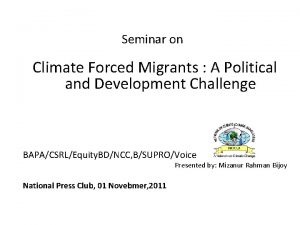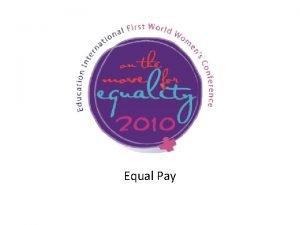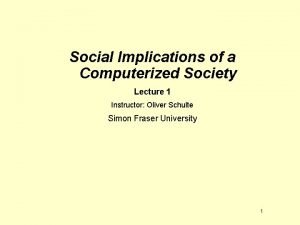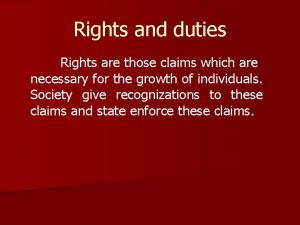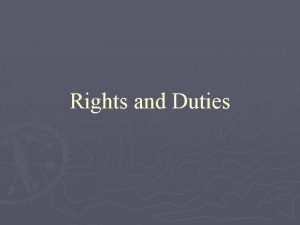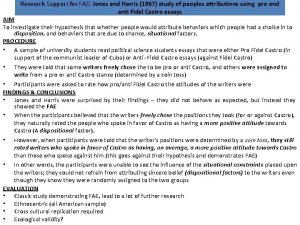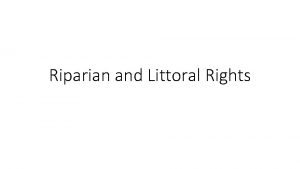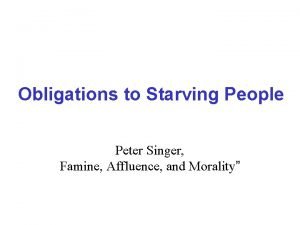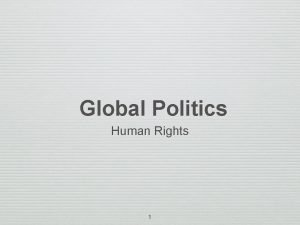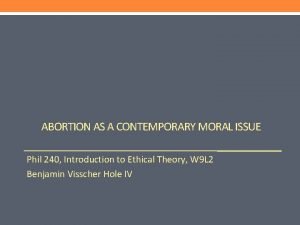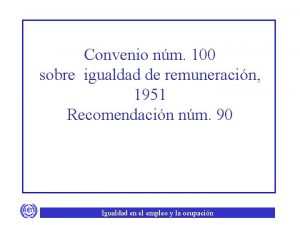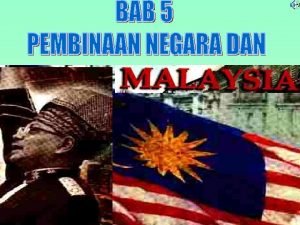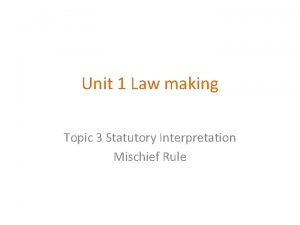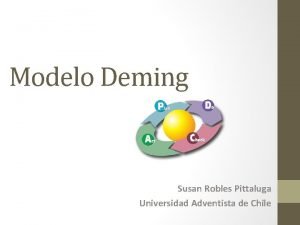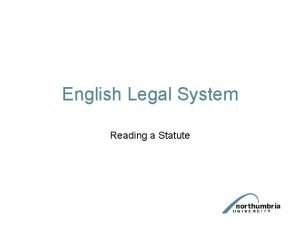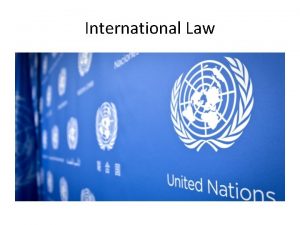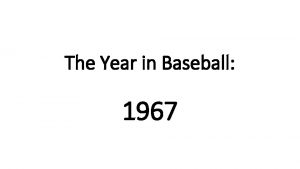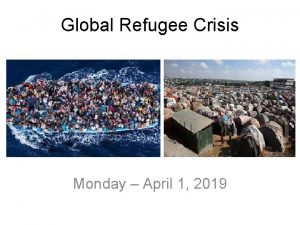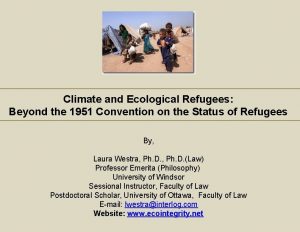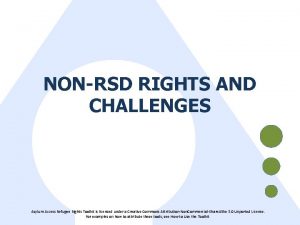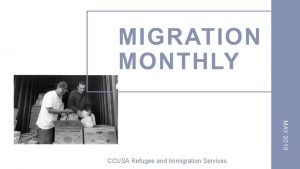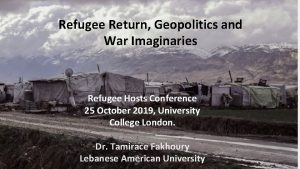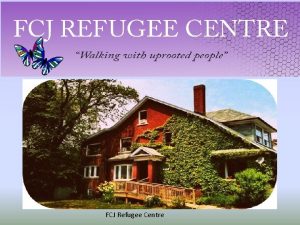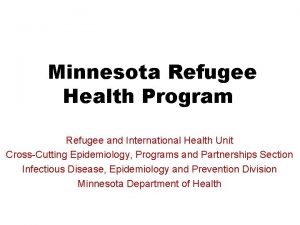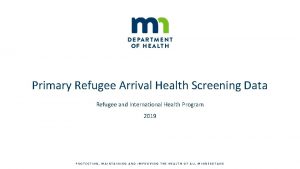Refugee Rights 1951 Refugee Convention and 1967 Protocol
![Refugee Rights 1951 Refugee Convention and 1967 Protocol in [your country] Refugee Rights 1951 Refugee Convention and 1967 Protocol in [your country]](https://slidetodoc.com/presentation_image_h2/8ab27fa15c57851fc27ae54e49b8c32e/image-1.jpg)





















- Slides: 22
![Refugee Rights 1951 Refugee Convention and 1967 Protocol in your country Refugee Rights 1951 Refugee Convention and 1967 Protocol in [your country]](https://slidetodoc.com/presentation_image_h2/8ab27fa15c57851fc27ae54e49b8c32e/image-1.jpg)
Refugee Rights 1951 Refugee Convention and 1967 Protocol in [your country]

Agenda: (4 hrs. 15 min. ) 1. Introductions/Icebreaker (10 min. ) 2. International Law and Refugees (45 min. ) 1. History behind the 1951 Refugee Convention/1967 Protocol 2. United Nations High Commissioner for Refugees 3. Activity: buzz groups (refugees defining refugee) 3. Defining Refugee (40 min. ) 1. What is a well-founded fear? 2. Activity: Case study role plays 4. Refugee Rights (45 min. ) 1. Activity: Case study role plays 5. Local Laws (45 min. ) 1. What is the reality? 2. Activity 6. Pertinent Declarations (30 min. ) 7. Your Organization (15 min. ) 8. Questions (15 min. ) 9. Evaluations (10 min. )

Workshop Objectives: • All participants will understand the purpose behind the 1951 Refugee Convention • All participants will be able to define a refugee according to the 1951 Refugee Convention • All participants will be able to define their rights under the 1951 Refugee Convention

International Law and Refugees: objectives • All participants will understand the purpose behind the 1951 Refugee Convention o All participants will be able to define international law o All participants will be able to understand the purpose behind the United Nations High Commissioner for Refugees

International Law and Refugees: • What is international law? o It is a body of law that the majority of nations have agreed upon that governs the manner in which they interact § even if certain nations have not agreed upon the laws, the laws are such that they are still binding o This is separate from national law

International Law and Refugees: • What is the 1951 Refugee Convention? o It is a legal agreement that many countries have signed and promised to follow in reference to refugees

International Law and Refugees: Historical Context • 1951 Refugee Convention was created in response to the mass displacement of peoples following World War II • The solution to the mass displacement of people from their original homes was to create safe areas for them to live until it was safe for them to return "home" • The United Nations High Commissioner for Refugees (UNHCR) was created by the Convention to oversee this process • The 1967 Protocol gets rid of the geographical and time limits of the original 1951 Refugee Convention

Activity: Define Refugee • Directions: Split into groups of 3 -4 people. Choose a recorder (someone to write down notes) and a presenter (someone to tell the large group your notes). Take 10 minutes with your group to discuss, in your individual opinions, the correct definition for refugee.

Definition of a Refugee: Objectives • All participants will be able to define a refugee according to the 1951 Refugee Convention o All participants will know the four elements that the UNHCR uses to define whether someone is or is not a refugee o All participants will understand what a well-founded fear is o All participants will know what will disqualify them from being considered refugees

Definition of a Refugee: 1. You must be outside the country you are from; and 2. You must be unable or unwilling to return to the country you are from; 3. Because you have a well-founded fear that if you return to your country, you will be persecuted (e. g. there is a threat to your life, freedom, or other human rights)

Definition of a Refugee (cont. ): 4. Based on one or more of the following reasons: o Your race; o Your religion; o Your nationality o Your political opinion; or o Your membership of a particular social group § could be your family § people with similar backgrounds, habits, social status § often characterized by something which is innate, unchangeable or fundamental

What is a well-founded fear? • A well-founded fear is where you are afraid o must be subjectively genuine o and objectively reasonable • There must be objective evidence from your country that shows you have a good reason to be afraid o newspaper articles o NGO reports o UN reports

Activity: Case Study Role Play • Mr. A was an engineering student in northern India when he heard that his father had died. Upon returning home, Mr. A discovered that his father had been tortured to death because he had allowed the Jammu Kashmir Liberation Front (a separatist group) to use a printing press. Mr. A was arrested two years later and interrogated with two other friends whom he never saw again. He escape a year later and flew to Singapore on a fake passport. o Split into groups of 3 -4 people and choose two people to play out the role of UNHCR official and Mr. A § What other questions would the official ask? § How should Mr. A respond? § Based upon this information, is Mr. A a refugee? Why or why not?

You have the RIGHT (as a refugee) to: • seek and enjoy asylum o to have international protection • non-refoulement o the right to NOT be returned to the country you fled • non-discrimination o to be treated the same as any foreign national in your country of refuge o includes equal rights to freedom of thought and freedom from torture and degradation

You have the RIGHT (as a refugee) to: • freedom of movement • work o adults should be given the right to earn a living • housing • education o children should not be denied access to education • public relief and assistance o medical help

Your OBLIGATION (as a refugee) to: • NOT engage in activities that pose a threat to the national security or public order of this country o IF you have committed a war crime, you would not qualify as a refugee • Respect the laws of this country • Respects the rights of others

Unlawful Entry: • You have the right to be free from penalties pertaining to the illegality of your entry to or presence within a country • IF it can be shown that you acted in GOOD FAITH • AND if you believed that there was ample cause for the illegal entry/presence • AND if you declare your presence quickly

Activity: Case Study Role Plays • Joseph is a Congolese refugee who lives in Nyarugusu camp with his wife and 5 children ages 5, 7, 11, 14, and 16. Joseph and his family find the living conditions in Nyarugusu very difficult. Joseph is worried about his childrens’ futures and their educations. He is also worried about the family’s safety because recently he heard that the relatives of some of the people who used to threaten him in the Congo are now living in Kigoma. Another friend told Joseph that it is easy to find work in Dar es Salaam and that life there is better. Joseph is thinking of taking his family to live in Dar es Salaam to be farther away from the people in Kigoma and to have better opportunities for his children. His attempts to get a permit to leave the camp failed and his friend advises him to leave anyway.

Activity: Case Study Role Play • Directions: Please answer the following questions • What would you tell Joseph about his safety concerns? What would you tell Joseph about his childrens’ educations? What would you tell Joseph about finding work in Dar es Salaam? If Joseph and his family leave Nyarugusu and move to Dar es Salaam, what would be the potential negative consequences? What about positive consequences? What would you advise Joseph to do?

Local Laws: • Talk about the reality of the situation in your country

Pertinent Declarations: • Look at our other resources detailing regional declarations that may be pertinent to your area

Your Organization: • Include who you are • Include what services you offer o Be specific about what you do or do not offer • Include contact information
 1951 refugee convention
1951 refugee convention 1951 refugee convention
1951 refugee convention Equal remuneration convention 1951
Equal remuneration convention 1951 Negative rights vs positive rights
Negative rights vs positive rights Legal rights and moral rights
Legal rights and moral rights Legal rights vs moral rights
Legal rights vs moral rights Negative right
Negative right Jones & harris (1967)
Jones & harris (1967) Israel and palestine
Israel and palestine Littoral real estate
Littoral real estate Negative right
Negative right Negative rights
Negative rights Positive rights vs negative rights
Positive rights vs negative rights Nyatakan tujuan laporan barnes 1951 diwujudkan.
Nyatakan tujuan laporan barnes 1951 diwujudkan. Convenio sobre igualdad de remuneración
Convenio sobre igualdad de remuneración Laporan barnes 1951
Laporan barnes 1951 Apakah kepentingan sistem ahli
Apakah kepentingan sistem ahli Primeira geração (1951-1959)
Primeira geração (1951-1959) Smith v hughes mischief rule
Smith v hughes mischief rule Laporan barnes 1951
Laporan barnes 1951 1951 st louis browns
1951 st louis browns Modelo deming prize
Modelo deming prize Cutter v eagle star 1998
Cutter v eagle star 1998

